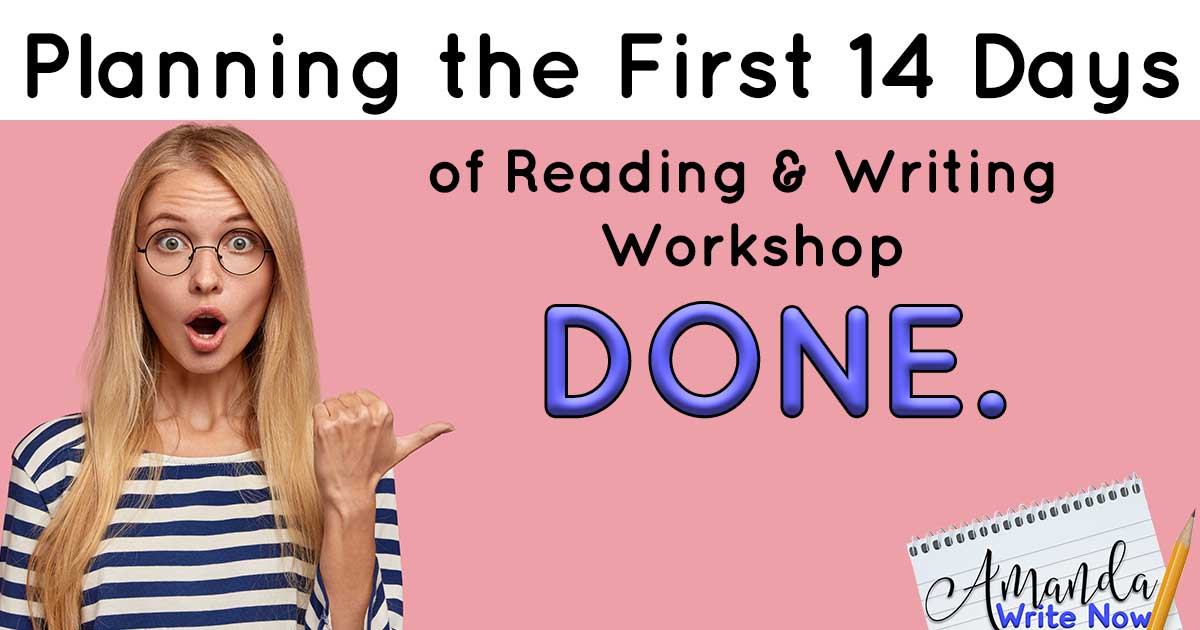
This article outlines exactly what I did to launch both reading and writing workshop in my classroom. If you are an English teacher wanting to teach using the writing and reading workshop model, then this post is exactly what you’ve been looking for! You’ll find my exact lesson outline for 14 total school days. Students will get to know each other, you’ll build a reading and writing community, and begin teaching workshop routines in a matter of 14 days.
If you’d like already done for you mini lessons, charts, videos and links to articles to launch writing workshop you should definitely check out this product in my store:
Day 1
Mini Lesson: Today we will teach students about living writerly & readerly lives while also following the workshop schedule.
Explain the workshop schedule using the chart to the right. Show students the meeting area where mini lessons will be taught. Explain that the mini lesson is always super short (ten minutes or less) so students can’t raise their hands or ask questions during the mini lesson. Practice time is when students can ask questions and get support from the teacher and other students.
For this first mini-lesson, keep it simple. Talk about a few books you love and writing ideas you have. Then, allow students to share their thoughts on these topics with a partner. Show the video too if you’d like:)
Practice: I always write practice time choices 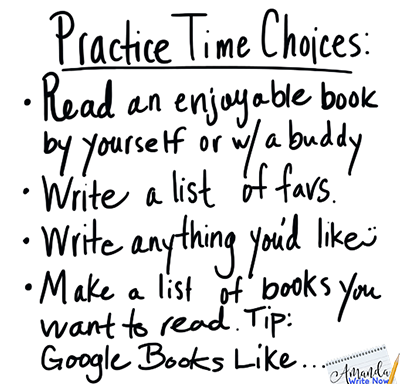 clearly on the whiteboard. I also approach students who struggle with this many choices. I provide two for them or a writing prompt that gets them excited. You can also support students in finding a book they’ll enjoy in your class library or listing favorites in their writing notebook.
clearly on the whiteboard. I also approach students who struggle with this many choices. I provide two for them or a writing prompt that gets them excited. You can also support students in finding a book they’ll enjoy in your class library or listing favorites in their writing notebook.
Share: Students come back to their groups and discuss what they accomplished during practice time and summarize the workshop schedule.
Day 2
Mini Lesson: Today we will practice the workshop schedule. Ask students to come to the meeting area and time them. Keep a running record of times on your whiteboard so students know times to beat.
Read a short mentor text aloud to students. Explain that soon students will write a piece within the same genre as the mentor text and publish it! Make sure your mini lesson is ten minutes or less. Time your mini lesson too so you don’t go over ten minutes. Making students sit in a meeting area for more than ten minutes is a little rough for some students depending on the meeting area.
Practice: Students can choose to read more mentor texts, their own independent reading books, list ideas for a writing piece or begin drafting a piece that emulates the mentor text. I want students to get used to choosing how they spend their independent time and also know that both reading and writing are acceptable activities during “practice time”. I support students in finding books they’ll enjoy during this practice time. I also support students in generating lots and lots of lists.
Share: Students come back to their groups and discuss what they accomplished during workshop. They can share a summary of their reading or read aloud something they wrote.
Day 3
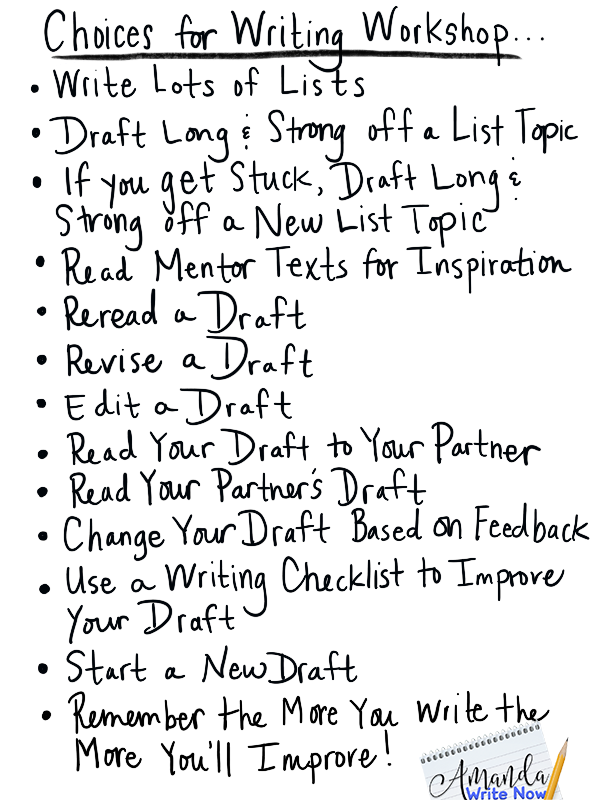
Mini Lesson: Today we will read another mentor text aloud, don’t analyze discuss or overthink it. Just let students soak it in. Appreciate the story, allow freedom to react. After reading simply ask students, “what’d you think?” You can carve out time later to annotate, analyze and discuss after a second read.
Practice: Students can choose to read independent books, buddy read, read mentor texts, list or draft anything they choose, a letter, a fictional story, an argumentative article, a graphic novel, whatever they want! I love providing a wide variety of choices for “practice time” because students are usually much more invested and on task when you give them choice! Note: some students may get overwhelmed with all the choices. For these students, approach them during a conference and limit the choices to two.
Reflect: Students come back to their groups and discuss what they accomplished today during workshop. They can also summarize the workshop schedule to each other.
Day 4
Mini Lesson: Today we will create a map of our reading & writing lives. I model my own map and tell stories from my childhood. I talk about my earliest memories with books and writing, my lows and highs throughout the years. Students love hearing stories from my childhood and they love telling stories from theirs. It is also an awesome opportunity to stimulate ideas for writing pieces.
Practice: Students should discuss memories from their reading & writing lives with each other. When they are done with their own life maps, they can choose to read independent books, buddy read, list story ideas or draft a piece of writing. As always, I list the choices clearly on the whiteboard.
Reflect: Have students come back to their groups and share their reading & writing life maps.
Day 5
Mini Lesson: Today we will read another mentor text. The more samples of the type of writing you expect your students to do the better! It is also a very simple mini lesson that takes very little planning. Just make sure whatever mentor text you choose is short enough to read in the ten minutes you have for your mini lesson.
Practice: Students read & write! They can read their own books or more mentor texts. Students can write emulations of mentor texts or within whatever genre they choose.
Reflect: Today have students reflect about what activity they tend to pursue most often during practice time. Do they tend to use their time reading or writing?
Day 6
Mini Lesson: Today students will begin listing & storytelling. I usually begin by listing people, places, objects and subjects that are important to me. I do this right in front of students under document camera in my own writer’s notebook. After I’ve listed half a page or so I pick something from my list to tell a story about. I explain that storytelling aloud with a partner is an excellent way to begin drafting!
Practice: Explain students need to have at least a page of lists, maybe more if they can. When students are done make sure they know they can story-tell topics from their list and begin drafting on that topic without stopping. Students can also read if they’d like:)
Reflect: Have students share their lists and parts of their drafts with each other.
Day 7
Mini Lesson: Today let’s teach students about writing stamina. I explain that writing for long periods takes practice. Just like when you learn the guitar, to run long distances or read a book, it takes time to build up your stamina to do these activities for long periods of time. If you don’t write very much then writing for a full five minutes might be challenging. If you write a bit then maybe writing for ten minutes should be your goal.
Practice: Set a timer and have students write for a full ten minutes without stopping. Tell students to use their lists as a starting off point. Track who struggles with this activity so you can support them later.
Reflect: Have student discuss their writing stamina goals. If they got tired after five minutes their goal should be to try and write for six minutes.
Day 8
Mini Lesson: Today students build up their writing stamina. Explain that sometimes when writing you get stuck, you get tired, bored, irritated with yourself or any number of other things happen. Explain these moments are when the list can be an invaluable tool! Draft in front of your students, get stuck, reread your list, pick a new topic and begin drafting anew.
Practice: For these stamina days, I require students to write because the goal is to build writing stamina. Explain to students that some days they have many options but on stamina days, students are working on writing for long periods. You can also alternate writing stamina days with reading stamina days. Time students again.
Reflect: Have students discuss with partners, strategies they used when they got stuck, bored or irritated with themselves. Share some of what you hear students say to the class. Make up things if you have to. Say something like, “Julie, noticed she was getting frustrated because she couldn’t spell a word, so she just guessed at the spelling, circled the word and kept right on writing!”
Day 9
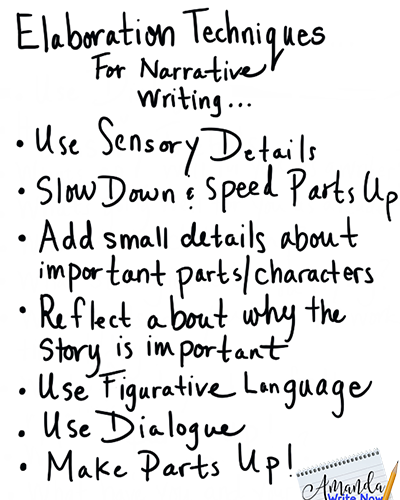 Mini Lesson: Today we will teach students elaboration techniques. Using a chart like the one to the right I demonstrate these strategies by drafting in front of my students.
Mini Lesson: Today we will teach students elaboration techniques. Using a chart like the one to the right I demonstrate these strategies by drafting in front of my students.
Practice: Tell students to spend the first ten minutes of practice time trying out an elaboration technique in their own writing. Have students write the elaborative section on a notecard to turn into you. After the first ten minutes, allow students to choose either reading or writing as their preferred activity.
Reflect: Have students share the elaboration techniques they wrote on notecards.
Day 10
Mini Lesson: Today students learn about conferences. It is important students understand what is expected during a conference with their teacher and with their peers. Charts like the one to the right can support students and teachers in achieving their goals during a writing/reading conference. It helps to do a fish bowl activity for a few days in a row to show students what a conference looks like.
Practice: Allow students to read or write. Conference with students and allow students to conference with each other in designated spaces around your room. Or designate a time frame that students conference with a writing partner.
Reflect: Have students share what they accomplished during work time today. Did they get a draft done, read a chapter in their book, meet with a writing partner?
Day 11
Mini Lesson: Today students learn about revision & editing. Students need to know the difference between revision and editing. The key to both is rereading a lot. I emphasize this key point with my students. I also emphasize that writing, revision and editing often occur all at the same time. I model this for my students today and often throughout the school year. It can be a hard concept for students to wrap their minds around. Showing the process in action is so key.
Practice: Tell students to practice the revision & editing techniques they saw you model. They can also choose to continue a draft they have not finished. Urge students to reread all that they have written over the course of the last few weeks. Rereading is key.
Reflect: Have students discuss how they changed their writing today. Tell them to describe the difference between editing and revising.
Day 12
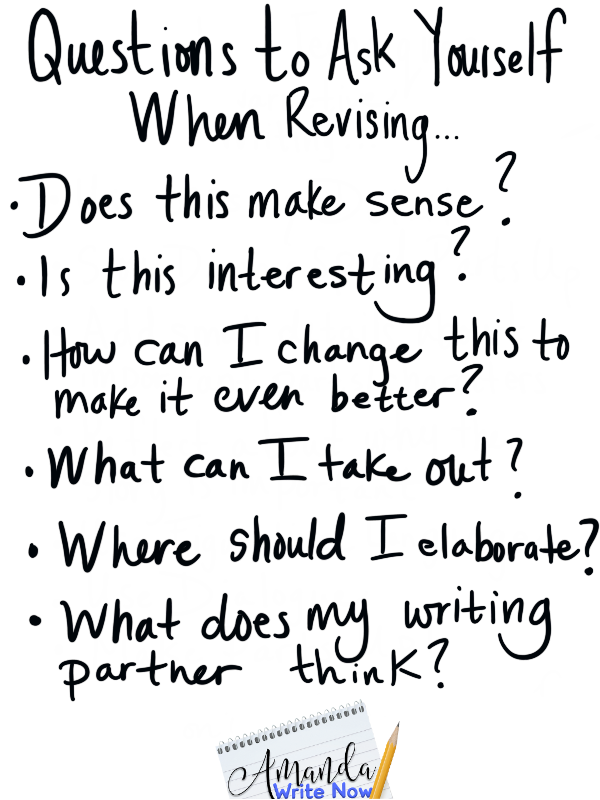 Mini Lesson: Today students practice revision & editing. Model rereading a draft of yours and using the revision and editing techniques included on the chart.
Mini Lesson: Today students practice revision & editing. Model rereading a draft of yours and using the revision and editing techniques included on the chart.
Practice: Have students reread drafts and rewrite parts on new pages within their writing notebook. Allow students to read aloud to partners or have partners read drafts aloud to the author of the draft.
Reflect: Have student volunteers read before and after revision segments of their writing.
Day 13
Mini Lesson: Today let’s teach students that writing and reading is never done! I love discussing this topic because it is so true! No piece of writing is ever truly done because it can always be changed and improved upon.
Practice: Let today be a reading and writing free-for-all! Let students read and write for as long as possible today! Set a timer when they begin and stop the timer when students seem antsy.
Reflect: Have students revisit their original stamina times and discuss any growth they have noticed after the last few weeks.
Day 14
Mini Lesson: Today students learn how to provide meaningful feedback. You are one teacher and there are many, many students. Therefore, it is integral students realize they are all teachers.
Tell a story of a time a student taught you something. Explain that you don’t know everything and that students are experts on topics you have no clue about. Allow students to choose partners if you can. Explain that students need to get used to asking questions and helping each other.
As readers, they should be recommending books to each other. They can keep a running list of “Books I Want to Read…” in their writing notebooks. As writers, students need to feel comfortable reading parts of their writing and asking for feedback. Charts like the one to the right can help students get started asking and giving feedback!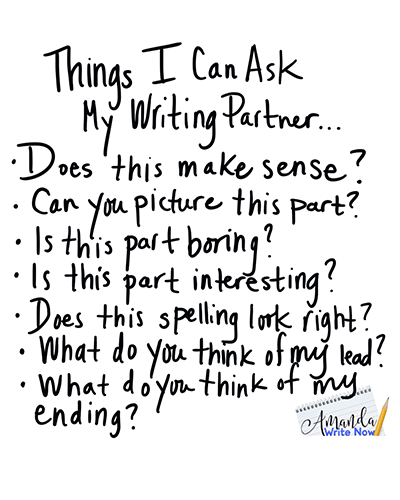
Practice: Set aside some time for students to recommend books to each other. Set aside time for students to discuss their writing pieces with each other. This should continue to happen over the course of the school year.
Reflect: Have student volunteers share out something they learned from each other!

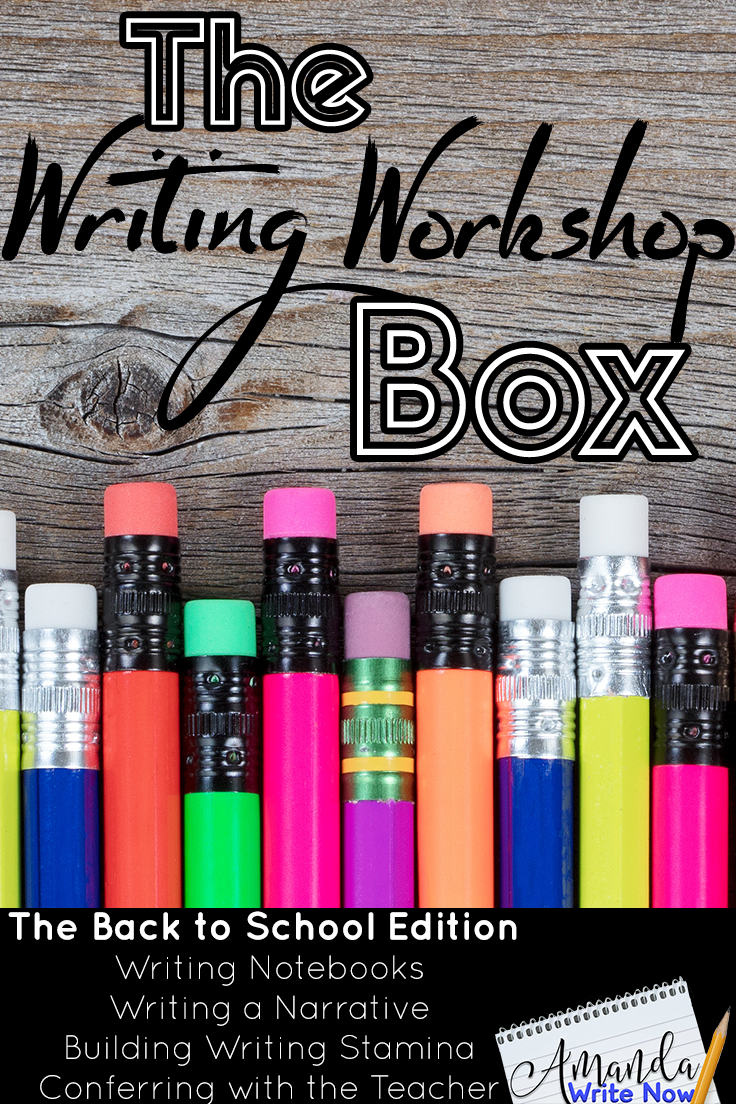
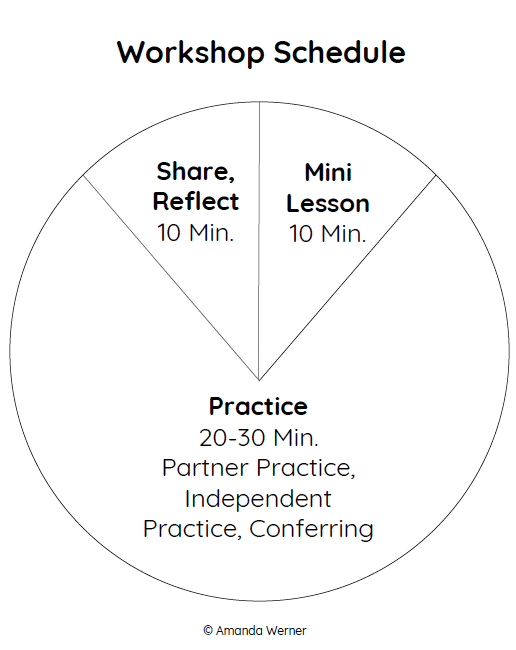
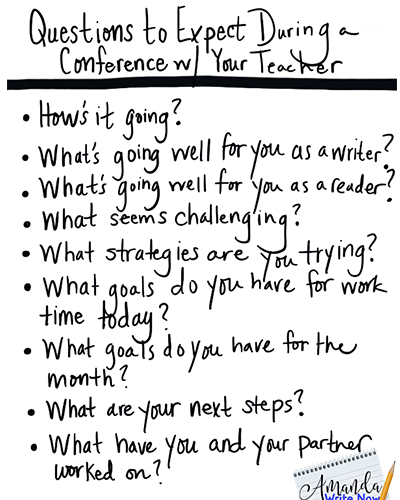



How do you set up your reading /writing workshop folder for middle school?
Hi Heather, this is such a great question! I don’t do folders. I have students write in notebooks and type only after they have drafted quite a lot in their notebook first. The purpose of this is so students are forced to reread and rework their writing when going from notebook paper to computer. Any handouts or articles I give students they might choose to store in folders, but I don’t require they organize those in any way and I don’t grade them. In the notebooks I have students write from front to back class notes and from back to front they brainstorm, draft and free write. I hope this helps! Let me know if you have any other questions and I’d be happy to help.
I absolutely love your podcast. It has helped me so much! You are a joy to listen to and your advice is so easy to understand and implement. Thank you for improving the lives of teachers’ workshops.
Monique, thank you so very much for your comment! It means the world to me to know that there are teachers out there like you listening! So happy to help:)
I also want to say that your podcast is so wonderfully reassuring! You make it sound so very approachable. I think I might be my own student and start my writing journal this summer. I’ve already generated a great topic list (3 pages worth)! I’m looking forward to next Friday’s on-line workshop.
Best regards,
Katy
Hi Katy! Thank you so much for taking the time to let me know the podcast is helping and reassuring. It makes all the work I put into it so worth it when I read comments like yours:) Also, that is just awesome you are writing yourself. Now, you have lots of material to use during your mini lessons! Talk to you Friday!
Amanda,
Thank you so much for these lessons! This will be my first year using the writers workshop method. I won’t begin this until the 2nd 9 weeks. These lessons are a great starting point for me.
You are so very welcome Sharon! Thank you so much for taking the time to leave this comment, it means the world to me. I’m so glad to know I’m playing a part in helping you get started:)
I am just about to start your writer’s workshop with my middle school students!
I love your podcast and cannot tell you how much I appreciate the simplicity of how you break it down!
Jaime! Thank you so much for taking the time to let me know this! I feel so bad for not putting episodes out more frequently. I really want to but with teaching full time I just haven’t been able to put new episodes out. Your comment motivates me to make time. THANK YOU!